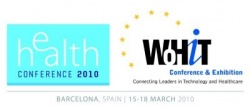World of Health IT 2010
15-18 March, Barcelona, Spain
The World of Health IT Conference & Exhibition (WoHIT) 2010 will for the first time be held in conjunction with the European Union’s annual High Level eHealth Conference and is being organised by the European Commission, HIMSS Europe, the Spanish Ministry of Health and Social Policy, the Regional Government of Catalonia and Foundation TicSalut.

The event is expected to draw over 2,000 European delegates. We asked Jeremy Bonfini, HIMSS Senior Vice President of Global Services about the hottest topics to be discussed and the general status of healthcare IT in Europe.
‘ One of the main themes in the conference is convergence – from home and personal health information to clinical information,’ explained Jeremy Bonfini. ‘One of our partners is Continua Health Alliance, a non-profit open industry alliance that includes over 200 leading healthcare and technology organisations, which certifies the interoperability of personal health and home health devices.
‘We will discuss how clinical information should and could converge with personal health information collected outside the hospital. Every day a patient produces incredibly rich information, such as glucose readings, blood pressure, and medication compliance. Does that matter to the clinician? Our answer is: Yes, absolutely. It matters to him especially in the case of a critical health event that happened outside the hospital. So one aim of the congress is to find an answer for the question: How do we bring the continuum of care closer together and have an integrated health record?
‘There is, of course, increased sensitivity over personal health information. However, neither the technical nor the regulatory side is an insurmountable barrier to deploying e-health. I think most governments confronted with the demographic changes and increasingly sick patients that are co morbid, see that the only choice to make the healthcare system more efficient is to have information available at the point of care (POC). While this is easy to say, it’s very difficult to make it happen, of course. So the aim of WoHIT is also to bring the right information to bear, so that clinicians, providers and CIOs can make the right decisions.’
In terms of concerns over digitising patient information, he pointed out that people overlook the possibilities e-health offers for security. ‘With IT you have the potential to control how information is used and by whom. Patients can be notified when health information is requested, whereas paper records can be viewed by almost anyone, with no chance of control. In hospitals, he pointed out, anyone can have free access to the paper chart at the foot of the bed and gain very private health data. Digitised information can require each person who touches the record to sign in and have security access only.
Asked how far e-health technology has spread in Europe, he said it is hard to generalise due to the incredibly diverse landscape. ‘There are many showcase opportunities within Europe of some very good, very cutting edge implementations that are good examples for the international community. In my opinion Europe is a little bit further ahead compared to other regions. In general, no country is as advanced as they would like to be, even in healthcare organisations such as Kaiser Permanente in the US, the Hong Kong Health Care Authority and Asklepios Barmbek in Germany they have almost a full level of the Electronic Medical Record Adoption Model (EMRAM) . This scale is presenting an adoption level, that HIMSS developed and that ranges from level one (low digitisation) to seven (the fully integrated paperless hospital). At the moment we think that there are only several dozen hospitals worldwide that fit into stage seven. So there is a lot to do and to reach, but Europe is on a very good and advanced path.’
26.01.2010





